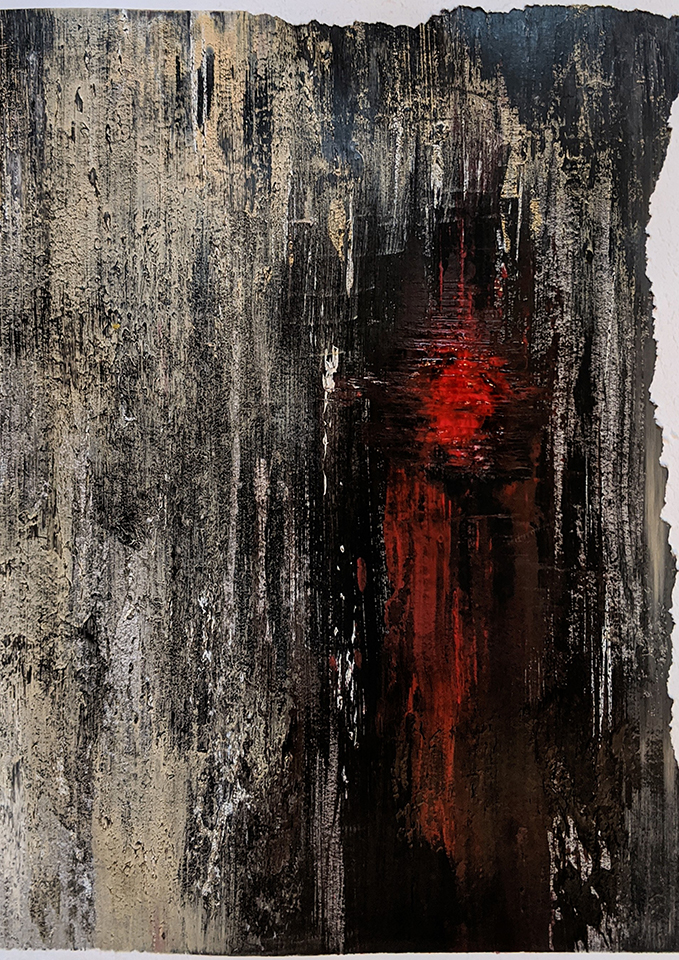Ankush Banerjee
Indian Soldier’s Rucksack: A Sketch
Festubert, Ouderdom, Neuve Chapelle,
Ypres, Marseilles 1914 – 1918
What else? Ghee, puffed wheat,
semolina, cigarettes, 200 cartridges,
spare hookah pipes, rifle-cleaning cloth,
malted Horlicks, Tiffin tins
a little stained by blood and mud. What else?
Kulas, spices, water-proof pugri-covers
resistant to trench wetness,
playing cards, friendship, extra soles and laces
for boots covered by sludge,
red blanket, industrial-grade mosquito repellent,
the trust of a shared cigarette, what else?
cordite for sappers, mirrors for the good-looking,
dry matchboxes, papad, pickles, woollen socks,
coconut oil, boiled sweets,
chutney, wrinkled, handwritten letters
and whatever is left
of wet cartridges. A longing for
gramophones, little dry pillows, khaki,
muslin, flute, or mouthorgan, certainly the desire
to sink in music, what else?
jam-pots full of raspberry that later
turn themselves into jam-pot bombs,
overcoats, slippers,
blood-chits, letters
from home
almost resembling
yosegaki
and all this
weighing –
a mere 42.8 kgs.
Righteous Among the Nations
Balidaghata, West Bengal, May-June, 1971
My grandmother’s family home
is an absurd boulder
fifty-three miles from the Bangladesh border.
It’s big enough to have country dogs Bagha Sheru and Ninu
keep intruders off pond and mustard fields.
In summers the siblings stay indoors, eating mangoes,
growing into the afternoon-listlessness
of quaint villages. In the slush and mud of monsoons, they make
game of dead crickets, ants, grasshoppers,
tying them to stones
that knock the surface of the pukur
one, two, three, four, plop.
Except one monsoon when the stone
knocks – one, two, three – four is a body –
of a girl they pull out from the waters,
the open mouth, with ant-tied-stone stuck,
resembling a wet plum to Sheru, the oldest among the three.
No one knows how to administer CPR.
The siblings play hopscotch on her flat chest, until
her lungs gurgle and become a balloon. Ask grandmother
where Kalindi the toothless maid comes from,
or why she harvests ants, or why
she prays to a different god, and she beams
as a girl rejoicing in her one deciding game
of hopscotch. I restrained Sheru
from biting her face – is
how she begins her history class,
drawing parallels with
Albert Battel, the Nazi Officer who saved an
insignificant but certain number of Jews.
While my great-grandfather
rages, and the dogs rage, and the men of the family rage –
for god knows from where the bastard girl has appeared, or
who her gods are – my grandmother stops eating,
punishing her body for the hole that lies in her family’s heart.
She stops eating means she stops eating!
Her oesophagus rots like earthworms rot in the cracked, wizened surface
of the pond in summers. On the fourth day,
great-grandfather relents.
Both girls are fed from the same plate.
When I tell her that Kalindi the maid washes and uses the same plate
grandmother eats in, She, at seventy-three, smiles as a girl
standing on the rooftop of her village home,
pointing a finger to the border,
and telling a younger girl – love and home –
both are skills. Only one you learn now. The other you
learn gradually,
everyday.
Choose wisely.

ANKUSH BANERJEE is a poet, researcher, serving Naval officer, and
mental health professional, currently based at New Delhi.His maiden volume of poetry, An Essence of Eternity was published by Sahitya Akademi, New Delhi in 2016. His poems can be found in Indian Literature, The Bombay Literary Magazine, Vayavya, Eclectica, Cha, Jaggery Lit, Dissonance Magazine and elsewhere. He is currently pursuing his PhD in Masculinity Studies.
SUDESHNA CHATTERJEE KUMAR, the illustrator, currently a Doctoral Candidate in the Department of Architecture and Regional Planning in IIT Kharagpur, identifies as an abstract expressionist and an architect and urban planner as well as a sustainability scientist in the making. For Sudeshna, the essence of her art lies in the expression of interactions and the emotions they evoke using different depiction techniques.

1 thought on “Two Poems”